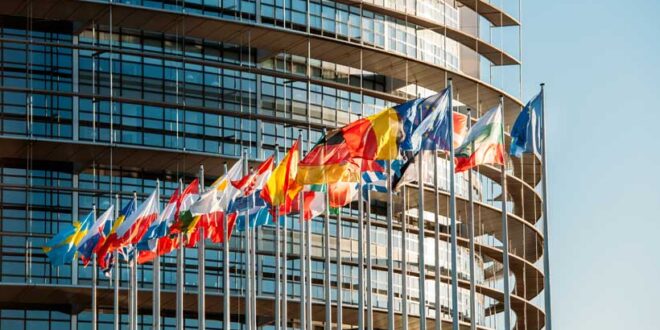Although modern Europe had exercised profound impacts on all the corners of the globe during the past centuries (1495-1945), it is undeniable that it declined substantially in the wake of the Second World War which was followed by the scenario of the bipolar domination by the United States and Russia (then the Soviet Union). The former has inherited from Europe culturally and institutionally but never been a part of its geography; the latter is a part of Europe geographically yet never integrated into it culturally, socially and even psychologically. Moreover, after 1945, Europe became a “thorny” question which required the two superpower to secure its security and equilibrium.
Given this, there is no question that Europe itself was unable to make it equal to the U.S. and the Soviet Union in the world affairs. To redress this fatal reality, the British elite policy-makers proposed that “To keep Germany down and keep Russia out of Europe, it had no option but to keep the U.S. in.” Since then, it is the United States that has secured a long-peace in Europe which has evolved into a civilian power in the name of the European Union during the Cold War and afterwards. By the eve of the new 21stcentury, it is widely held that “the United States of Europa”, though still emerging internationally, would aim to end American supremacy. For sure, this is what Washington can’t accept for the sake of its elite’s obsession with the “unilateral world order” mandated by the special destiny.
There is no question that the sudden collapse of the Soviet Union did push the European Union to undergo a rapid expansion of the quantity and quality as well. It is an ancient wisdom that a strong European Union should be built on its coherence and integration rather than the sheer binding together which leads to a potential disunity and diversity in all policy issues. However, the EU has been driven to include all European countries potentially including Ukraine while excluding Russia and Turkey although Ankara has submitted its request to be granted a full-membership of the EU from the early 1960s. Now Europe wants to play major role in the world affairs rather than being treated as the playground only. The key remains how the responses are from London and Washington, that is, the Anglo-American axis in the new century.
Historically speaking, as American scholar Walter Mead put it, there have been only two global powers as what Europeans still sometimes refer to as “Anglo-American” powers: United Kingdom and the United States. The British Empire was, and the United States is, concerned not just with the balance of power in one particular corner of the world but also the evolution of what we today call “world order”. A worldwide system of trade and finance have made both Britain and America rich, those riches are what gave them the capabilities to project the military force and intellectual impacts based on the latest technology globally to ensure the stability of their-dominated international systems. Now with acting as the Anglo-American axis in anti-Russian coalition, Washington and London have worked in concert to achieve their core goals: “To keep Russia down during the Ukrainian war and keep the EU disunited as much as they could. In doing so, they must act in concert to be involved into the hybrid war against Russia until the last Ukrainian man fighting in the war.
Given some controversial memories of the past and the nature of geopolitics, Poland and the Baltic states have been the closest allies of the United States and Britain during the Ukrainian war and its aftermath. Yet, some countries including the back-borne of the EU community—France and Germany—have revealed their practical needs and diplomatic traits to end the conflict in Europe. But they have failed all the efforts thus far due to the reasons that the U.S. and Britain have committed to providing the fuel to the burning fire in Ukraine. For sure, the United States has every reasons from history and geopolitics to bolster the European Union but also prevent its drifting off into a geopolitical vacuum. If it is separated from Europe in politics, economics and defense, America would become geopolitically an island off the shore of Eurasia where the transcontinental mass stretching from the Volga to the Yangtze and from the Himalayas to the Arctic Ocean is under the jurisdiction of China, Russia and their friendly countries such as Iran and Afghanistan now. Accordingly, the United States has resented the looming challenge when they covet Eurasia as the pivot of the grand chessboard. As U.S. strategists like Kissinger, Brzezinski and etc. once argued that “no matter which power, either of Europe or Asia, dominates Eurasia, that danger is seen by Washington as a structural threat to its primacy in the world.”[1] Yet, China and Russia will certainly react by all means to how the U.S. would have treated them in the world affairs.
China, Russia and their partners have expected the European Union to play the major role in dealing with the volatile world situation. Accordingly, it is necessary for France and Germany to act in concert in managing the present EU distress and then directing EU development in the future. Historically and strategically, it is proper to say that the first key milestone for rapprochement between Germany and France is the Elysee Treaty of friendship and reconciliation that was signed in 1963. Under the agreement, Paris and Bonn pledged to consult each other, prior to any decision, on all questions of foreign policy with a view to reaching an analogous position. Equally important is the Aachen Treaty signed by Berlin and Paris in 2019, which aims to enhance EU cohesion and provide joint security externally. Now acting as the two powerful engines of the EU, the accord between France and Germany will justify that the future of Europe depends closely on the consensus between the two leading powers in all terms.
Yes, some political groups have voiced their concerns or even anger that France and Germany have fallen into the exclusive Franco-German axis, leaving the rest of the EU membership in second row. Due to this, they have come to question the bloc’s nature and development trend. Given this, the U.S. and Britain have openly driven their closest allies bordering Russia to become more and more aggressive and even cross the bottom line in the anti-Russian campaign economically, militarily and diplomatically in the name of the so-called shared-values. The designs of the Anglo-American axis has insured the rules-based global trade system and economic order which had been weakened since the Trump administration. Yet, a peaceful and prosperous Europe will be a reality only when France and Germany are forged into a real power center. It stands to reason that the two countries have common responsibilities, complemented economies and compatible military capacity. In addition, Germany has acted as the EU’s economic engine and security pivot due to its location at the very heart of Europe.
Still, there are two challenges facing the Franco-German accord. First is history. France and Germany need to learn lessons from each other’s previous bid for mastery in Europe and global hegemony. The price Germany paid was its own destruction and France was totally demoralized as well in 1945. Second is the issue of EU distress. As Joschka Fischer put it earlier, Europeans must not allow wishful thinking to obscure their important facts, as occurred when the European Monetary Union was formed in the 1990s. It argues that there were earlier conflicts between individual member states regarding national economic and fiscal policy, along with their political culture and divergent mentality. But willful ignorance prevailed over rational analysis. Third is the resolve of the EU. Now with the Ukrainian crisis dragging on, the EU can’t make the short-sighted decision again. As consensus will not come easily, a genuine accord between Germany and France is required to struggle for strategic autonomy. Yet, as long as the U.S.-led anti-Russian campaign continues, Washington and London will make all efforts to call on their allies and partners to underscore continued international support for Ukraine. Although not all allies were rustled up, the most radical governments of the NATO and the EU are present at the banner of the U.S.-led crusade: e.g. Secretary of State Blinken flew into Brussels recently where he talked up “unity” among the West while proclaiming that what was at stake with the Ukrainian war was not going to be cost-free. Yet, the reality is that Russian analysts have a devastating assessment of Europe’s economic future, reporting that the EU’s short-sighted policies have already pushed the region into a full-blown economic crisis. Even some Western analysts share this view that the EU is suffering from the ongoing sanctions pressure, rather than the consequences of the energy crisis. Europe has almost canceled its exports to Russia, primarily technology and equipment exports. Everybody understands that Europe invented these problems all by itself, by blocking almost the entire exports to Russia for political reasons, while expecting no retaliatory measures, for some reason.
In sum, Europe has deeply-rooted legacy of statecraft to end wars and to create peace. Now is the right time for France and Germany to stand up for struggling for power, profits and prestige for the EU family rather than acting as a coadjutant of the Anglo-American axis.
[1] Henry Kissinger, Diplomacy (NY: Simon & Schuster, 1994), p. 813; Also see Zbigniew Brzezinski, The Grand Chessboard: American Primacy and its Geostrategic Imperatives (NY: Basic Books, 1997), p. 27.
 Geostrategic Media Political Commentary, Analysis, Security, Defense
Geostrategic Media Political Commentary, Analysis, Security, Defense





